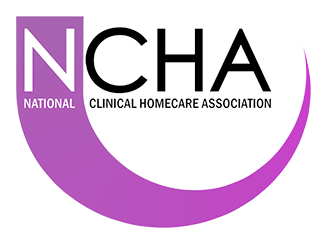FOR GENERAL PUBLIC
Clinical Homecare Explained
Clinical homecare is firmly centred around the needs of each individual patient. Freedom, choice and comfort form the basis of every clinical homecare service, and for many patients the experience of the service they receive are clear.
The clinical homecare services are provided by the NHS and the private homecare sector in collaboration to support all patients registered on a homecare service. All services are defined by agreements between NHS and the homecare companies.
All patients must opt into receiving homecare services and it is the NHS clinician who refers the patient to each homecare provider. The services provided range from delivery of medication but also can extend to the administration of medicines or training patients / carers how to administer treatment themselves. The services are governed by agreed standards and agreements that have been put into place.
The main aim is to provide services to allow patients to be supported in their home environment whilst remaining under the care of their NHS clinical team.
The following are some quotes from patients:
It saves time…. there is no queuing…. it’s more private. I like everything about the service.
Once again, I must thank you for your excellent personal support that you give me. Last week the replacement items arrived and have made administering my TPN so much easier and protects the sterile process. You are a star, please continue to shine in these difficult times. Wishing you and your colleagues the very best of health.
Thanks to you and the gang for keeping my deliveries on time and therefore reducing my anxiety. Keep up the good work and stay safe.
Important to Note:
If a patient has a homecare question or query they should contact the homecare provider they are registered with or their NHS clinical team. The NCHA does not have the responsibility to answer individual questions from individual patients. However, NCHA works with a number of patient groups who form a Patient Advisory Council and this groups works in collaboration with the NCHA and the NHS in the support of all patients and the NHS.
Examples of the types of Clinical Homecare Services
The list of homecare service types is not exhaustive. If you are a patient seeking to access clinical homecare services, please contact your NHS clinical team to find out about services that are available to you.
Examples of the types of Clinical Homecare Services
- Angioedema and other severe allergies (Respiratory)
- Anti-infectives – Viral Hepatitis including Hepatitis B and Hepatitis C
- Anti-infectives – Viral HIV / Anti-retroviral Therapy (ARV)
- Anti-infectives -Infection Management – HPAT/OHPAT
- Blood disorders – Erythropoietin Stimulating Agents (ESA)
- Blood disorders – iron overload including oral and injectable medicines
- Blood disorders including eculizumab haemophilia & thalassaemia
- Cancer – Oncology and Haematology – Injectable
- Cancer – Oncology and Haematology – Oral includes all oral anti-cancer chemotherapy and immunotherapy
- Cardiovascular Pulmonary Hypertension (PH)(PAH)
- Endocrine – Fertility
- Endocrine – Growth Hormone (adults)
- Endocrine – Osteoporosis and bone metabolism
- Endocrine – Somatostatin analogues including Octreotide for acromegaly, lanreotide and pasireotide for all indications
- Endocrine Growth Hormone (paediatrics)
- Enteral nutrition and special diets – Enzyme Replacement Therapy including Lyposomal Storage Disorders (LSD)
- Enteral nutrition and special diets – Low tech enteral feed services; delivery of special foods
- Immune system – Dermatology (skin) including methotrexate for dermatology indications, ustekinumab, ciclosporin, secukinumab etc. for dermatology indications
- Immune system – Immunosuppression – Transplant
- Immune system – Inflammatory bowel and related disorders including methotrexate, ustekinumab, for gastroenterology indications
- Immune system – Multiple Sclerosis
- Immune system Intravenous and Subcutaneous Immunoglobulin
- Intravenous Nutrition and Home Parenteral Nutrition (HPN)
- Musculoskeletal – Rheumatic disease including methotrexate for rheumatology indications
- Nutrition & metabolic disorders unclassified including acute porphyrias
- Parkinson’s Disease (PD) and related disorders
- Psychoses and related disorders e.g. clozapine
- Renal & GU – eculizumab, home dialysis
- Respiratory – Cystic Fibrosis (CF) adults
- Respiratory – Cystic Fibrosis (CF) paediatrics
- Respiratory – Idiopathic Pulmonary Fibrosis (IPF)
- Respiratory – Terbutaline
- Skin also see Immune system – Dermatology
- Clinical Trials
- Orphan diseases and unlicensed uses

